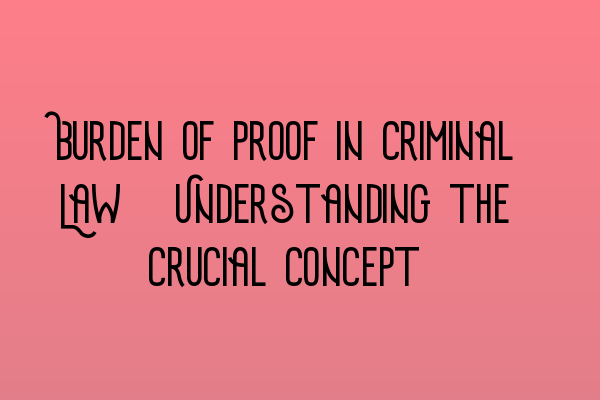Burden of Proof in Criminal Law: Understanding the Crucial Concept
When it comes to criminal law, the concept of burden of proof is of utmost importance. It refers to the obligation of the prosecution to prove the guilt of the accused beyond a reasonable doubt. This legal principle ensures that individuals are not wrongly convicted based on mere suspicions or assumptions.
In the criminal justice system, the burden of proof is placed on the prosecution for a good reason. The government has the resources and authority to gather evidence and present it in court, while the accused may be at a disadvantage due to limited access to resources and legal expertise.
The burden of proof is often likened to a scale of justice. It is incumbent upon the prosecution to tip the scale in their favor by presenting convincing evidence that establishes the guilt of the accused. If the scale remains balanced or leans towards the innocent side, the accused must be acquitted.
Types of Burden of Proof
There are generally two types of burden of proof in criminal law:
- Beyond a Reasonable Doubt: This is the highest standard of proof required in criminal cases. It means that the evidence presented must be so strong and convincing that there is no reasonable doubt in the minds of the jurors or judge regarding the guilt of the accused.
- Balance of Probabilities: This standard is used in civil cases and requires the party with the burden of proof to establish that it is more likely than not that their version of events is true. Unlike the criminal standard, the balance of probabilities allows for some level of doubt.
In criminal law, the burden of proof always falls on the prosecution, and they must meet the “beyond a reasonable doubt” standard to secure a conviction. This ensures that individuals are not unjustly deprived of their liberty.
Challenging the Burden of Proof
As a defendant, it is crucial to understand that you do not have the burden of proof; it is the responsibility of the prosecution to prove your guilt. However, you and your legal team can challenge the burden of proof by:
- Highlighting inconsistencies in the evidence presented by the prosecution.
- Presenting a strong defense that raises doubts about your culpability.
- Cross-examining the prosecution’s witnesses to expose inconsistencies or biases.
- Offering an alternative version of events that is plausible.
- Presenting expert witnesses or evidence that supports your defense.
Challenging the burden of proof is an essential component of the criminal defense strategy. By effectively casting doubt on the prosecution’s case, you increase the likelihood of a favorable outcome.
If you are studying for the SQE 1 or SQE 2 exams, it is crucial to have a clear understanding of the burden of proof in criminal law. The SQE exams assess your knowledge and understanding of various legal concepts, including the burden of proof. To prepare for these exams, consider enrolling in SQE 1 Practice Exam Questions and SQE 1 Practice Mocks FLK1 FLK2. These preparation courses provide comprehensive study materials and practice questions to enhance your understanding and maximize your chances of success.
Additionally, if you need assistance with SQE 2 preparation, explore the SQE 2 Preparation Courses. These courses are designed to equip you with the necessary tools and knowledge to excel in the SQE 2 exam.
Conclusion
The burden of proof is a fundamental concept in criminal law. It places the responsibility on the prosecution to prove the guilt of the accused beyond a reasonable doubt. Understanding the burden of proof and how to challenge it is crucial for defendants and legal practitioners alike.
If you have further questions or require legal guidance regarding criminal law or any other legal matter, please don’t hesitate to contact us.
